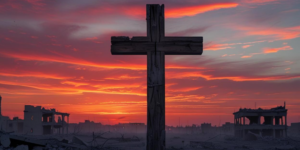Our Resurrected High Priest
Paul tells us in 1Corinthians 15:17 that “if Christ has not been raised, your faith is vain; you are yet in your sins.” The resurrection of Christ is essential for freeing us from the slavery that the law of sin imposes on us and that we are born with.
The basis for the resurrection of Christ has its beginnings in the Old Testament book of Genesis. The resurrected Christ was prefigured by Melchizedek who was “Without father, without mother, without descent, having neither beginning of days, nor end of life; but made like unto the Son of God; abides a priest continually.”1 Because of this, Jesus’ High Priesthood in heaven is of the order of Melchizedek. His name means king of justice or righteousness. Melchizedek was king of Salem which means peace. He was the king of righteousness and the king of peace. The Melchizedek priesthood of Christ is based on the power of an endless life, and not on a human commandment.2
Jesus’ different order of priesthood required a different law associated with it by which we could draw near to God. There was no perfection available from the Levitical priesthood in spite of its animal sacrifices; therefore, the Levitical High Priest in Jerusalem wasn’t able to do this for the people because the prior sacrifices were insufficient, “For it is not possible that the blood of bulls and of goats should take away sins.”3 Jesus could not be a High Priest of the Israeli tribe of Levi because He was born of the tribe of Judah which was the royal tribe and not the priestly one.4 Also, Jesus would not have been a priest on earth because there were already priests that offered gifts at that time according to the Mosaic Law.5
God took an oath that Jesus would be a priest forever after the order of Melchizedek.6 Jesus did not take this upon Himself. God foreordained that Jesus would live forever: which He did after He shed His blood, died, and resurrected. This ensured an uninterrupted ministry after His death. After Jesus completed His time on earth, He resurrected and ascended in order to live on to be our High Priest in heaven. The Levitical high priests died and were replaced. Hebrews 7:24-25 says of Jesus: “But this man, because he continues forever, has an everlasting priesthood. Therefore he is able also to save them to the uttermost those that come to God by him, seeing he ever lives to make intercession for them.” This became possible because of Christ’s resurrection. Christ was suitable for this because He was unstained by sin; and was given a place of honor in heaven as a result. The Levitical high priests had to offer daily sacrifices for their own sins as well as those of the people. Christ offered up Himself to God once, holy and blameless. Christ was perfect, and was appointed High Priest by God’s oath, and not by ancestry and human appointment. 7
Christ was required to make an offering in heaven after He resurrected: He offered up Himself and His own blood.8 The Levitical high priest prefigures this in the sense that only the high priest in Jerusalem offered gifts and sacrifices to God in the Holy of Holies once a year, which he offered for himself and for the sins of the people: always with the blood of animals; but, he was the only one who could enter, which signified that the way into the holiest place and full holiness were not open to the people while the tabernacle on earth was standing; and that their required offerings were not able to cleanse the hearts of the people who brought them, until the time came for God’s new and better way.9 Christ’s work is more important because the new agreement, of which He is the High Priest, contains far more wonderful assurances;10 and Christ made it possible for us to be on His throne in heaven. We can enter into the Holy of Holies in heaven. Christ was our forerunner. 11
The new covenant was alluded to by Jeremiah. He says: “Behold, the days come, saith the LORD, that I will make a new covenant with the house of Israel, and with the house of Judah: Not according to the covenant that I made with their fathers in the day that I took them by the hand to bring them out of the land of Egypt; which my covenant they brake, although I was an husband unto them, saith the LORD: But this shall be the covenant that I will make with the house of Israel; After those days, saith the LORD, I will put my law in their inward parts, and write it in their hearts; and will be their God, and they shall be my people. And they shall teach no more every man his neighbour, and every man his brother, saying, Know the LORD: for they shall all know me, from the least of them unto the greatest of them, saith the LORD; for I will forgive their iniquity, and I will remember their sin no more.”12 If the first covenant had been faultless, there would have been no need to replace it with a second one.13
In the second covenant, Jewish Christians would no longer have the obligations of the first covenant with its offerings which did not perfect the people’s consciences; otherwise, they would have ceased to be offered. Christ’s death for the redemption of the transgressions under the first testament enabled them to receive the promise of eternal inheritance.14 In order for the second covenant to take effect, the death of the testator was required for the testament or the will to take effect.15 Christ, with the one offering of Himself, sat down at the right hand of God, and perfects forever those that are sanctified. The sacrificial Lamb resurrected, and became our High Priest in heaven.16 Jesus fulfilled the requirements for our freedom while He was on earth which included His shed blood because “almost all things are by the law purged with blood; and without shedding of blood is no remission.”17 This is why Jesus, God’s Son, had to die in order to be the sacrificial Lamb; and, He had to resurrect in order to be the High Priest of the new testament as God had proclaimed, and enable us to bring forth fruit.18
_____________________________________________________
1 Hebrews 7:3. Cf. Genesis 14:18; Hebrews 5:4-10: 6:20; 7:11-21.
2 Cf. Hebrews 7:15-16
3 Hebrews 10:4. Cf. Hebrews 7:12, 17-19; 8:7; 9:9-10
4 Cf. Hebrews 7:13-14
5 Ibid., 8:4
8 Cf. Hebrews 7:26-28
9 Ibid., 7:27-8:3; 9:11-12
10 Ibid., 9:6-10
11 Cf. Hebrews 7:22; 8:6
12 Cf. Revelation 3:21 and Hebrews 6:18-20
13 Jeremiah 31:31-34. Cf. Hebrews 8:8-13; 10:16-17
14 Cf. Hebrews 8:7
15 Cf. Hebrews 9:14-15; 10:1-3
16 Cf. Hebrews 9:16-28
17 Cf. Hebrews 10:12-14
18 Hebrews 9:22







































